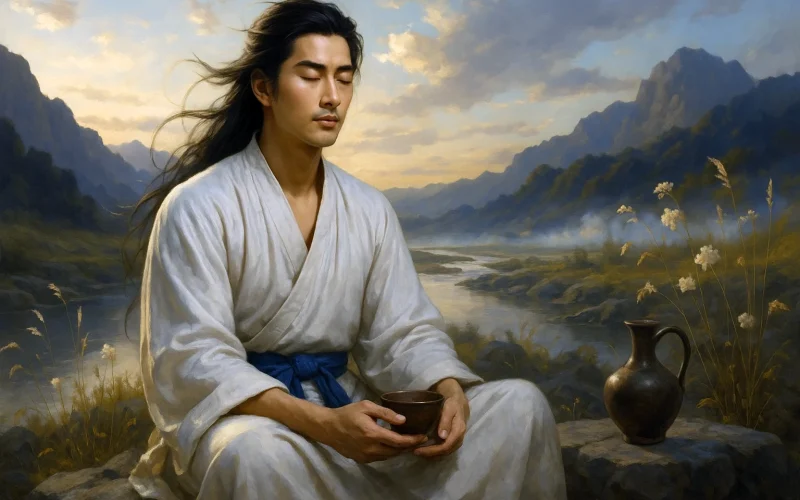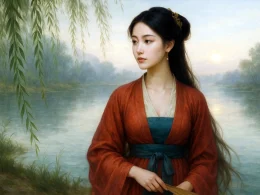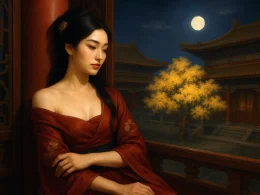A man’s life cannot last forever;
It is hard even to live long.
You like immortal land as ever.
Can you tell the way not to go wrong?
Our companionship may not fade,
For we have shared same joy and pain.
If I have left you in the shade,
In sunshine I’ll appear again.
We can’t get together forever;
In time we both shall disappear.
Could I stay when you are gone?
Never.Thinking of this,
I’m sad and drear.
But good deeds will be left tomorrow.
Why then do you not do your best?
Though drinking may drive away sorrow,
What good has wine done to your rest?
Original Poem
「形影神 · 其二 影答形」
陶渊明
存生不可言,卫生每苦拙。
诚愿游昆华,邈然兹道绝。
与子相遇来,未尝异悲悦。
憩荫若暂乖,止日终不别。
此同既难常,黯尔俱时灭。
身没名亦尽,念之五情热。
立善有遗爱,胡为不自竭?
酒云能消忧,方此讵不劣!
Interpretation
This poem, written circa 413 CE, is the second in Tao Yuanming’s triptych Body, Shadow, and Spirit. In the first poem, "Body" takes the dominant role, lamenting life’s brevity and death’s inevitability to "Shadow" while advocating carpe diem. Here, the perspective shifts as "Shadow" responds—a dialogic reversal that deepens the poet’s philosophical inquiry into life’s meaning.
"Shadow" replies in a tone reminiscent of Confucian moralists, rejecting "Body’s" naturalistic arguments. Rather than chasing immortality, it emphasizes the imperishability of "virtuous deeds" (立善) and "enduring love" (遗爱), revealing Tao’s profound pursuit of spiritual transcendence. The surface dialogue between shadow and body masks an internal debate between two worldviews within the poet’s mind.
First Couplet: "存生不可言,卫生每苦拙。"
Cún shēng bùkě yán, wèishēng měi kǔ zhuō.
To preserve life eternally is impossible; every effort to prolong it proves futile.
The opening negates the delusion of immortality while exposing the futility of life-preservation practices, introducing existential resignation.
Second Couplet: "诚愿游昆华,邈然兹道绝。"
Chéng yuàn yóu Kūn Huá, miǎorán zī dào jué.
Once I longed to roam Kunlun's peaks, but that path lies severed, remote beyond reach.
Mythological references (Kunlun Mountain, realm of immortals) dismiss escapist fantasies of transcending mortality.
Third Couplet: "与子相遇来,未尝异悲悦。"
Yǔ zǐ xiāng yù lái, wèi cháng yì bēi yuè.
Since we first met, never have joy or grief parted us.
"Shadow" affirms its loyalty to "Body," suggesting companionship should transcend transient emotions.
Fourth Couplet: "憩荫若暂乖,止日终不别。"
Qì yīn ruò zàn guāi, zhǐ rì zhōng bù bié.
Though shade may briefly divide us, while light remains, we never truly part.
The tree-shade metaphor underscores an inseparable bond, offering solace against impermanence.
Fifth Couplet: "此同既难常,黯尔俱时灭。"
Cǐ tóng jì nán cháng, àn ěr jù shí miè.
Such union cannot last—together we'll fade into darkness.
A stark acknowledgment of shared annihilation, stripping away illusions of permanence.
Sixth Couplet: "身没名亦尽,念之五情热。"
Shēn mò míng yì jìn, niàn zhī wǔ qíng rè.
The body perishes, fame with it; this thought sets my five passions aflame.
The dissolution of posthumous reputation ignites anguish, fueling the desire for spiritual legacy.
Seventh Couplet: "立善有遗爱,胡为不自竭?"
Lì shàn yǒu yí ài, hú wéi bù zì jié?
Good deeds bequeath enduring love—why not strive for this with all your might?
The core argument: virtuous actions offer true immortality through their lasting impact.
Eighth Couplet: "酒云能消忧,方此讵不劣?"
Jiǔ yún néng xiāo yōu, fāng cǐ jù bù liè?
Wine claims to drown sorrows, but how crude compared to this!
A deliberate rejection of hedonism, positioning moral action as superior to ephemeral pleasures.
Holistic Appreciation
Structurally, this poem continues the prior dialogue but shifts to "Shadow’s" voice, refuting both Daoist immortality myths and "Body’s" carpe-diem escapism. Instead, it proposes "virtuous legacy" as the path to transcendence. The line "The body perishes, fame with it; / This thought sets my five passions aflame" crescendos with existential dread, while "Good deeds bequeath enduring love" offers resolution.
Compared to the first poem’s fatalism, this work adopts a more rational tone, infused with social responsibility. Its unadorned language belies profound depth, interrogating what makes human life meaningful beyond mere existence.
Artistic Merits
The poem’s brilliance lies in its Confucian reframing of immortality through moral legacy—a deliberate counter to Daoist naturalism and hedonism. Technically, it maintains taut parallelism (e.g., "存生不可言,卫生每苦拙") and employs culturally charged imagery (Kunlun Mountain, shade/light symbolism).
Emotion tempers its philosophy: lines like "Since we first met, / Never have joy or grief parted us" humanize the debate, while "This thought sets my five passions aflame" reveals visceral vulnerability. This synthesis of Confucian activism and Daoist acceptance showcases Tao’s philosophical independence.
Insights
The poem posits that against death’s inevitability, neither physical endurance nor drunken oblivion sustains meaning—only virtuous action leaves an imperishable imprint. By having "Shadow" advocate moral legacy, Tao suggests a gentle rebellion against fate: when neither immortality nor pleasure avails, enduring love becomes our quiet defiance.
In today’s world, this 5th-century voice remains startlingly relevant: it urges us to confront mortality not with denial or distraction, but by crafting a legacy of tangible goodness—the truest form of earthly eternity.
Poem translator
Xu Yuanchong (许渊冲)
About the poet

Tao Yuanming(陶渊明), 365 – 427 CE, was a poet, literary figure, fu writer, and essayist active during the late Eastern Jin and early Liu Song dynasties. Born in Chaisang (near present-day Jiujiang, Jiangxi Province), he pioneered a new genre of pastoral-themed literature, expressing profound philosophical insights through simple language. His poetic style became an enduring aesthetic standard in classical Chinese poetry.












